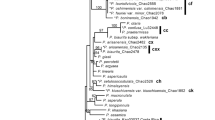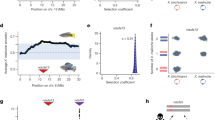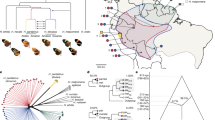Abstract
THE importance of the study of natural hybridization is obvious in view of the large part it plays in the process of evolution. There have been considerable differences of opinion, first as to the possibility of recognizing natural hybrids and, secondly, as to the status of the parents once the possibility of hybridization has been established. We are not concerned here with the second controversy, for it must be recognized, now, that the existence of hybrids both within and between species is well substantiated. Although hybrids are one of the banes of the taxonomist, their frequent occurrence in Nature makes it important that they should be recognizable without doubt. Further, when such recognition is possible they cease to be a bane.
This is a preview of subscription content, access via your institution
Access options
Subscribe to this journal
Receive 51 print issues and online access
$199.00 per year
only $3.90 per issue
Buy this article
- Purchase on SpringerLink
- Instant access to full article PDF
Prices may be subject to local taxes which are calculated during checkout
Similar content being viewed by others
References
Kerner von Marilaun, A., "The Natural History of Plants", trans. and edit. F. W. Oliver, vol. 2 (London, 1895).
Lotsy, J. P., "Evolution by means of Hybridization" (The Hague, 1916).
Cockayne, L., New Phytol., 22, 105 (1923).
Cockayne, L., and Allan, H. H., Ann. Bot., 48, 1 (1934).
Wiegand, K. M., Science, 81, 161 (1935).
Allan, H. H., Bot. Rev., 3, 593 (1937).
Anderson, E., Ann. Mo. Bot. Gard., 23, 159 (1936).
Huskins, C. L., Science, 49, 399 (1929).
Nilsson, N. H., Lunds Univ. Arsskrift., N.F. Avd., 2, Bd. 24, No. 6 (1928).
Nilsson, N. H., Lunds Univ. Arsskrift., N.F. Avd., 2, Bd. 27, No. 4 (1930).
Nilsson, N. H., Hereditas, 15, 309 (1931).
Anderson, E., Ann. Mo. Bot. Gard., 23, 511 (1936).
Anderson, E., and Hubricht, L., Amer. J. Bot., 25, 396 (1938).
Riley, H. P., Amer. J. Bot., 25, 727 (1938).
Larisey, M. M., Amer. J. Bot., 27, 624 (1940).
Anderson, E., Ann. Mo. Bot. Gard., 28, 147 (1941).
Ownbey, M., and Weber, W. A., Amer. J. Bot., 30, 179 (1943).
Goodwin, R. H., Amer. J. Bot., 24, 425 (1937).
Wernham, H. F., New Phytol., 11 (1912).
Diels, L., In Abderhalden. "Handbuch der Biologischen Arbeitsmethoden", Abt. 11, Teil 1 (Berlin and Vienna).
Sprague T. A., in "The New Systematics" (edit. J. S. Huxley) (Oxford).
Wilmott, A. J., J. Bot., 59, 93 (1921).
Baker, H. G., Ph.D. Thesis, Univ. of London.
Baker, H. G. . Accounts of Melandrium, M. dioicum and M. album for the "Biological Flora of the British Isles" sponsored by the British Ecological Society, J. Ecol., in the press.
Author information
Authors and Affiliations
Rights and permissions
About this article
Cite this article
BAKER, H. CRITERIA OF HYBRIDITY. Nature 159, 221–223 (1947). https://doi.org/10.1038/159221a0
Issue date:
DOI: https://doi.org/10.1038/159221a0
This article is cited by
-
The inheritance of certain characters in crosses between Melandrium dioicum and M. album
Genetica (1951)
-
Natural hybridization with particular reference to introgression
The Botanical Review (1949)
-
“Criteria of Hybridity”
Nature (1947)



